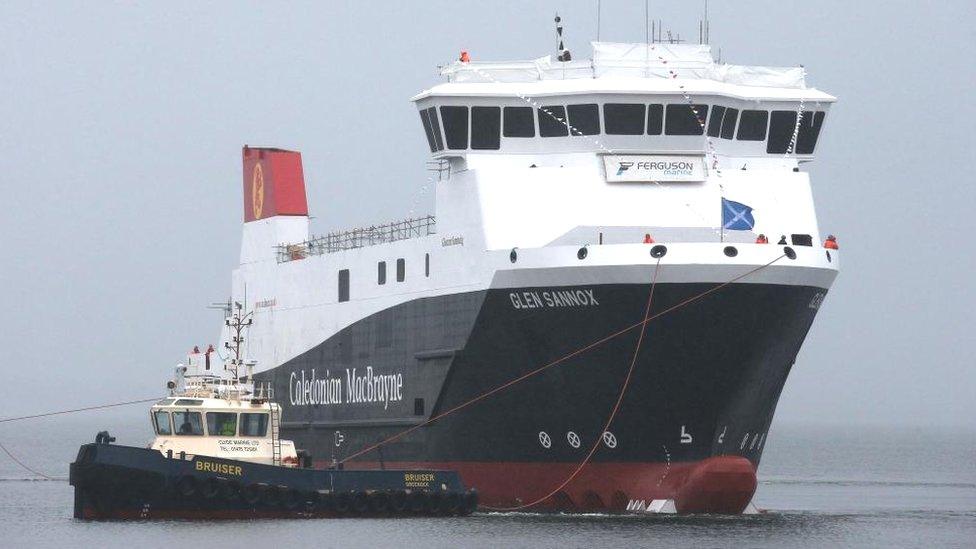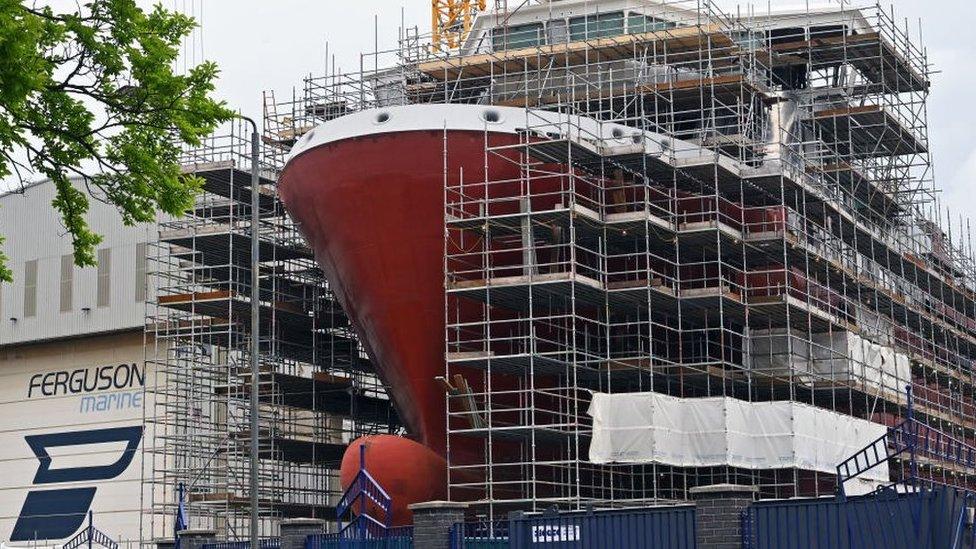Ferguson shipyard: Ferry costs rise again after safety changes ordered
- Published

The costs of two CalMac ferries being built at the Ferguson shipyard have risen again after regulators ordered safety changes.
Completing Glen Sannox and Glen Rosa will now cost at least an extra £24m, the yard's boss has told MSPs.
The delivery date for the second ship has been pushed back by five months, to May 2025.
The passenger capacity of the ships may also be reduced from 1,000 to 852 to satisfy emergency evacuation rules.
The two ships, which were meant to cost £97m, are now 3.5 times over budget and will be delivered six years late.
Ferguson chief executive David Tydeman told Holyrood's net zero committee, external the yard was continuing to face "design gaps, associated re-work and surprises".
He believes this is due to errors made in the past, both before and after the Port Glasgow shipyard was nationalised in 2019.
The latest costs increase is partly driven by changes required by safety regulator the Maritime and Coastguard Agency (MCA).
The ships will not be allowed to carry passengers unless improvements are made to emergency evacuation routes.
Weeks of sea trials
Plans to widen corridors and fit extra staircases on each ship have now been agreed with the MCA, but discussions are ongoing about about "eleven vertical exit routes" from spaces below the car decks.
Talks are also taking place with CalMac and ferries procurement agency CMAL on reducing the passenger capacity of both ships by 148.
The delivery date for Glen Sannox is scheduled for 31 March next year, but several weeks of sea trials will be required by CalMac so it may miss the start of the summer season on the busy Arran route.
Delivery of the second ship Glen Rosa, formerly known as Hull 802 and also destined for the Arran route, has been pushed back by five months until 31 May 2025.

The second ferry Glen Rosa, until recently known only as Hull 802, is still on the slipway
When government-owned ferries procurement agency CMAL placed the order with the Inverclyde shipyard nearly eight years ago, the two ferries were expected to cost £97m and were due for delivery in 2018.
The latest increases mean the ships will cost nearly £380m if written-off government loans to the shipyard are included in the figures, as suggested by Audit Scotland.
As well as a £24m increase for completing the ships, the latest update also suggests an increase of about £20m in worst case contingency funding in case there are further problems.
Sea trials of Glen Sannox and the commissioning of the ship's LNG propulsion system, which is not due to begin until after Christmas, could also lead to further problems, Mr Tydeman acknowledged in his letter.
"It would be very unusual if there are not issues of equipment or systems failing or breaking or highlighting some of the specification changes needed, particularly with the first of class aspects of the LNG system," he wrote.
'Repeated interference'
When the ferries contract was awarded in 2015, the yard was owned by Jim McColl, a successful businessman who had rescued it from administration just weeks ahead of the previous year's Scottish independence referendum.
His company Ferguson Marine Engineering Ltd (FMEL) beat off competition from some of Europe's leading shipbuilders after CMAL officials judged its proposed design to be the best in terms of "quality" despite being the most expensive.
But the project soon ran into trouble as design challenges led to mounting costs and delays.
CMAL has blamed this on "catastrophic contractor failure", while Mr McColl maintains the problems stemmed from CMAL's flawed concept design and repeated interference in the design process.
FMEL fell into administration in August 2019, and the yard was later nationalised by the Scottish government.
A BBC Disclosure documentary last year presented evidence that the procurement process carried out by CMAL may have been "rigged" in favour of FMEL.
A leading lawyer has been appointed by the CMAL board to investigate the Disclosure allegations, and is expected to report shortly.
The BBC understands Barry Smith KC has been asked to examine whether "fraud" occurred but his remit does not extend to examining whether procurement rules were broken.